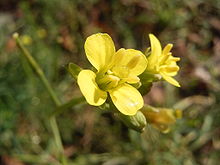Diplotaxis muralis
| Diplotaxis muralis | |
|---|---|

| |
| Scientific classification | |
| Kingdom: | Plantae |
| Clade: | Tracheophytes |
| Clade: | Angiosperms |
| Clade: | Eudicots |
| Clade: | Rosids |
| Order: | Brassicales |
| Family: | Brassicaceae |
| Genus: | Diplotaxis |
| Species: | D. muralis
|
| Binomial name | |
| Diplotaxis muralis (L.) DC.
| |
| Synonyms | |
|
Sisymbrium murale | |
Diplotaxis muralis, the annual wall-rocket, is a species of flowering plant in the family Brassicaceae. This plant is native to Europe, Asia, and Africa, but it is found throughout the temperate world, where it has naturalized. This is an erect mustard-like plant rarely reaching half a meter in height. It has lobed leaves and its stems are topped with dense inflorescences of yellow, or occasionally light purple, flowers with small oval petals and large anthers. The fruit is a podlike silique two to four centimeters long.
Description[]
It is an annual, but sometimes grows as a perennial,[1] growing up to 15–60 cm (5.9–23.6 in) tall on unbranched stems.[2] It has lobed leaves, which form a rosette at the base of the plant. They are 2–9 cm (0.79–3.54 in) long and 1–3 cm (0.39–1.18 in) wide.[1] It blooms in summer, between May to September in the UK,[2] and between April to August in China.[1] The flowers are yellow, with oblong sepals and longer, obovate petals.[1] Later, it produces a fruit capsule, long cylindrical with a short beak.[2] It contains 2 rows of yellow brown seeds,[2] which are ovoid or ellipsoid shaped.[1]
Taxonomy[]
D. muralis was first published by Augustin Candolle in Syst. Nat. Vol.2 on page 634 in 1821, based on an earlier description by Carl Linnaeus.[3][4] Linnaeus had named it 'Sisymbrium murale' in his seminal publication 'Species Plantarum' in 1753.[1]
There are two known subspecies;
- Diplotaxis muralis subsp. ceratophylla (Batt.) Mart.-Laborde
- Diplotaxis muralis subsp. simplex (Viv.) Jafri[3]
The Latin specific epithet muralis is interpreted as 'growing on walls'.[5] D. muralis is commonly known as 'annual wall-rocket' or 'wall rocket', in the UK,[6] [7] as it can be found growing on old walls, and is similar in form to wall rocket (Diplotaxis tenuifolia ), which is taller and bushier.[2]
Several cytological and morphological studies have suggested that D. muralis originated from natural hybridization between D. tenuifolia and .[8]
Distribution and habitat[]
It is native to temperate regions of North Africa, Europe and parts of western Asia.[9][10]
Range[]
It is found in North Africa, within Algeria, Libya, Ethiopia, Morocco and Tunisia. Within Asia it is found in the Caucasus, Georgia (country) and Turkey. In middle Europe, it is in Austria, Belgium, Czech Republic, Germany, Hungary, the Netherlands, Poland, Slovakia and Switzerland. In southeastern Europe, within Albania, Bosnia and Herzegovina, Bulgaria, Croatia, Greece, Italy, Malta, Montenegro, North Macedonia, Romania, Serbia, Slovenia and Ukraine. Also in southwestern Europe, it is found in France, Portugal and Spain.[10]
It has naturalised in the UK since 1778, when it was found in a field of oats raised from imported seeds from a ship wrecked on the Kent coast.[9]
Habitat[]
It grows in waste and disturbed ground,[2] such as beside railways, roads and on tips.[9]
Ecology[]
It is pollinated by bees and other flying insects.[2] It is occasionally cultivated and ploughed into fields as a 'green manure'.[9]
References[]
- ^ a b c d e f "FOC Vol. 8 Page 24". efloras.org. Retrieved 11 November 2017.
- ^ a b c d e f g Reader's Digest Field Guide to the Wild Flowers of Britain. Reader's Digest. 1981. p. 43. ISBN 9780276002175.
- ^ a b "Diplotaxis muralis (L.) DC. is an accepted name". 23 March 2012. theplantlist.org. Retrieved 10 November 2017.
- ^ "Brassicaceae Diplotaxis muralis DC". ipni.org. Retrieved 10 November 2017.
- ^ Archibald William Smith A Gardener's Handbook of Plant Names: Their Meanings and Origins, p. 160, at Google Books
- ^ F.H.Perring, P.D.Sell and S.M.WaltersA Flora of Cambridgeshire, p. 54, at Google Books
- ^ "Diplotaxis muralis wall rocket". rhs.org.uk. Retrieved 11 November 2017.
- ^ Ueno, O; Wada, Y; Wakai, M; Bang, SW (2006). "Evidence from photosynthetic characteristics for the hybrid origin of Diplotaxis muralis from a C3-C4 intermediate and a C3 species". Plant Biol (Stuttg). 8 (2): 253–9. doi:10.1055/s-2005-873050. PMID 16547870.
- ^ a b c d "Diplotaxis muralis". brc.ac.uk. Retrieved 11 November 2017.
- ^ a b "Taxon: Diplotaxis muralis (L.) DC". ars-grin.gov. Retrieved 10 November 2017.
External links[]
- Diplotaxis (plant)
- Flora of North Africa
- Flora of Algeria
- Flora of Libya
- Flora of Ethiopia
- Flora of Morocco
- Flora of Tunisia
- Flora of Europe
- Flora of the Caucasus
- Flora of Georgia (country)
- Flora of Turkey
- Flora of Austria
- Flora of Belgium
- Flora of the Czech Republic
- Flora of Germany
- Flora of Hungary
- Flora of the Netherlands
- Flora of Poland
- Flora of Slovakia
- Flora of Switzerland
- Flora of Albania
- Flora of Bosnia and Herzegovina
- Flora of Bulgaria
- Flora of Croatia
- Flora of Greece
- Flora of Italy
- Flora of North Macedonia
- Flora of Malta
- Flora of Montenegro
- Flora of Romania
- Flora of Serbia
- Flora of Slovenia
- Flora of Ukraine
- Flora of France
- Flora of Portugal
- Flora of Spain
- Plants described in 1821
- Taxa named by Carl Linnaeus